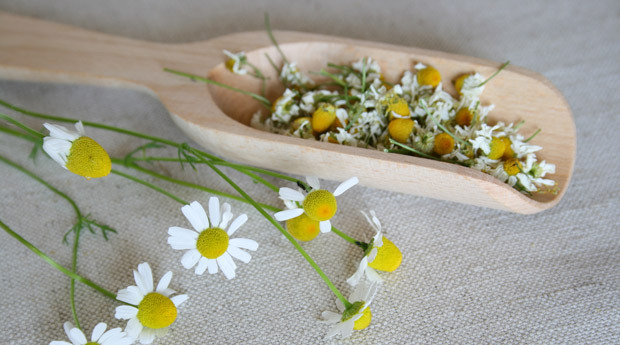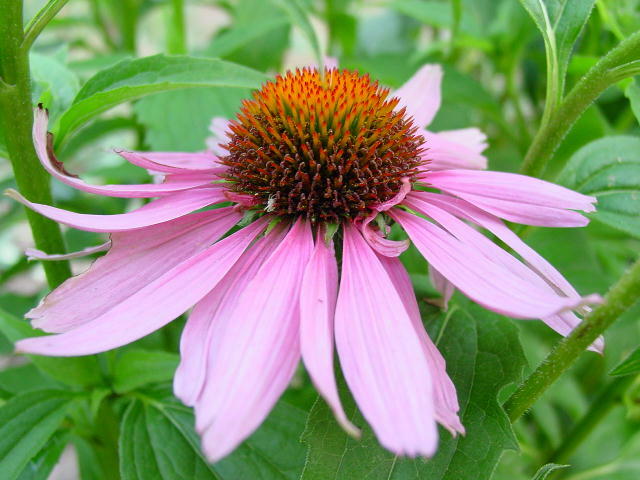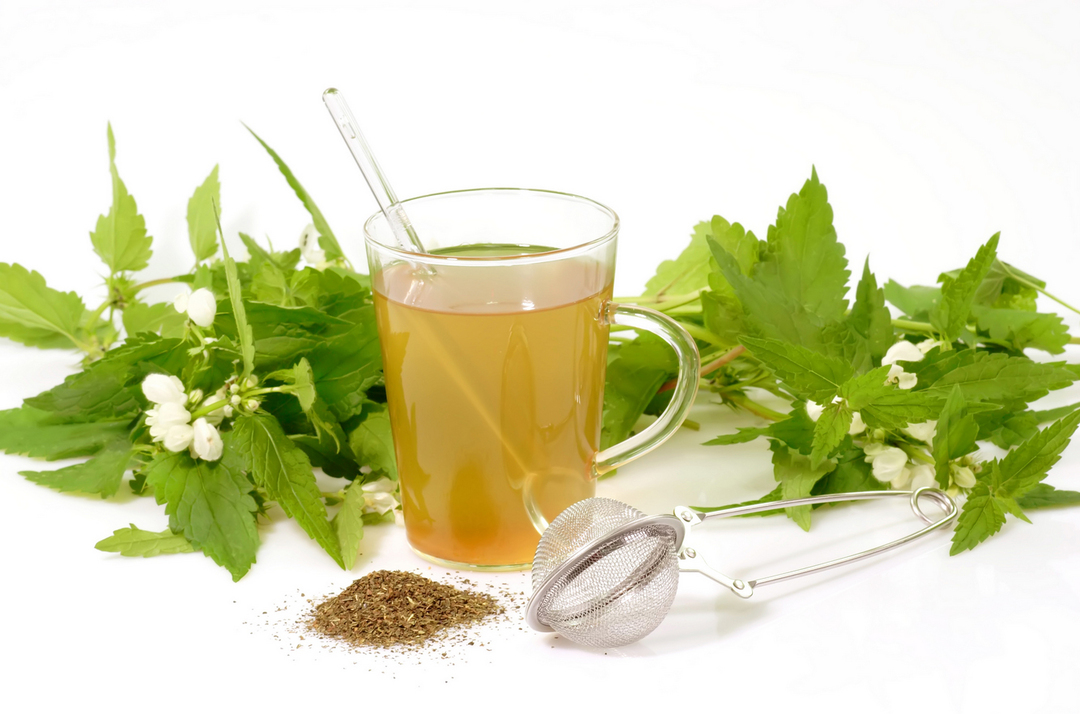Kalina: medicinal properties, indications and contraindications
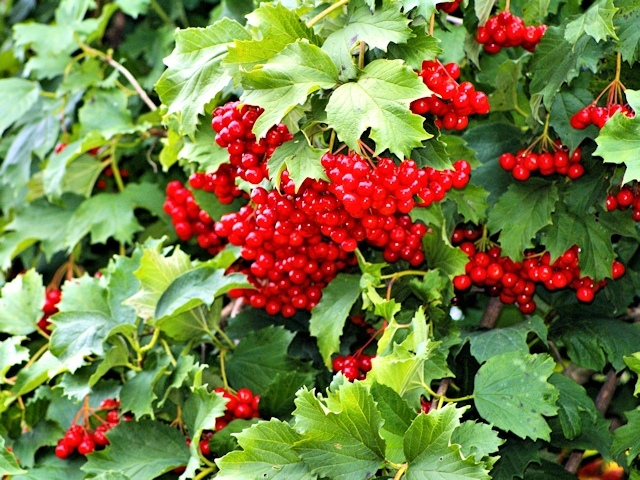 Kalina is a genus of deciduous or evergreen bushes and small trees belonging to the Adoksov family.It has more than one and a half hundred species, most of which are distributed in the northern hemisphere of the planet.Fruits, as well as the bark of this unpretentious shade-tolerant plant have healing properties and are widely used in folk and official medicine.
Kalina is a genus of deciduous or evergreen bushes and small trees belonging to the Adoksov family.It has more than one and a half hundred species, most of which are distributed in the northern hemisphere of the planet.Fruits, as well as the bark of this unpretentious shade-tolerant plant have healing properties and are widely used in folk and official medicine.
In our country, Kalina is found almost everywhere in temperate and subtropical latitudes, including in the North Caucasus and Siberia.It grows in the forests, as well as along the banks of rivers and lakes.Most often we can meet Kalina ordinary( red), alder, Buryat and birchwood, as well as Kalina David.
The leaves of the bush are opposite;The flowers collected in the apical inflorescence are white or pinkish in color.The fruit is a fleshy red berries.
Note : Black Kalina berries can not be eaten because they are poisonous!
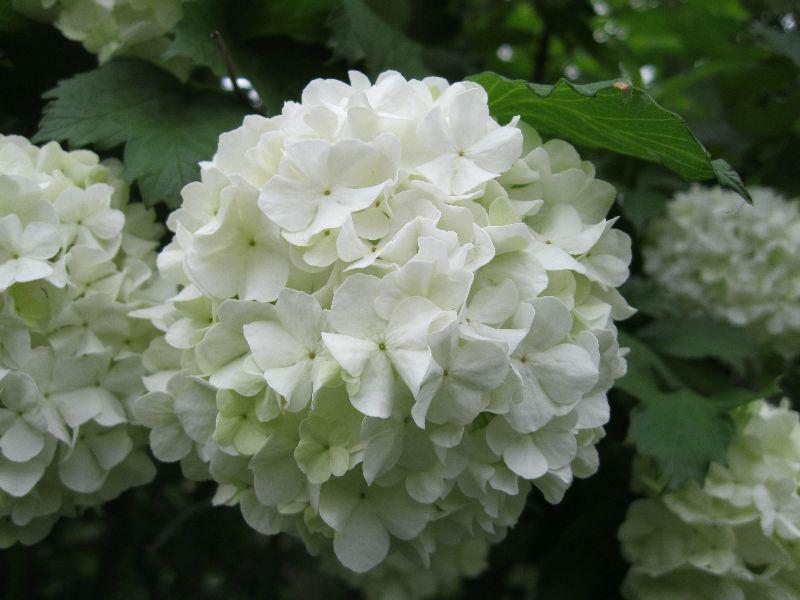 The flowering period of the viburnum is quite short - it starts at the end of May and ends, usually at the end of the first week of June.
The flowering period of the viburnum is quite short - it starts at the end of May and ends, usually at the end of the first week of June.
As a raw material for the preparation of medicinal products, the bark collected during the period of sap flow, as well as leaves, roots and flowers are used.They are dried outdoors under a canopy.Curative properties also have berries, which are recommended to collect after the first frost, relieving the fruit of the bitter taste.
Fruit harvesting should be carried out only in dry weather.After harvesting the berries can be stored in dried or frozen form, or cook jam from them.When cooking, not all useful properties are stored.It is recommended to slightly lighten the fruits of Kalina in the sun, and then - to dry in a preheated oven to + 60 ° C.Store this raw material for medicinal decoctions better in bags of natural tissue.
Note : From berries Kalina receives valuable oil, which is widely used in cosmetology and medicine.
Biologically active substances Kalina
The following useful substances are present in fruits and other parts of the plant:

- carotenoids;
- glycosides;
- bioflavonoids;
- organic acids;
- vitamins( A, C, E, K, P);
- tanning agents;
- β-sitosterol;
- microelements( iron, chromium, calcium, nickel, selenium, etc.).
Healing properties of Kalina

Kalina has anti-inflammatory, astringent and bactericidal properties due to tannins present in its composition.Also tannins, which are the most in the bark of the bush, contribute to the acceleration of the healing process with ulcerative lesions of the organs of the gastrointestinal tract.
Flowers and fruits are a valuable source of a number of vitamins, so decoctions and infusions of them are indicated for hypovitaminosis, blood clotting disorders, anemia and to strengthen the body's defenses( immunity).Active substances have a mild sedative effect, which has a beneficial effect on the nervous system.
Preparations of Kalina allow to normalize the activity of the digestive system.Substances contained in all parts of the plant( but mostly in fruits) have diuretic( diuretic) properties;They lower arterial pressure in hypertensive disease and contribute to a decrease in edema that occurs against a background of certain diseases of the cardiovascular system.Decoctions have a beneficial effect on the organs of the urinary system( kidneys).
Traditional medicine recommends Kalina for the treatment of a number of "female diseases" and disorders, including fibroids and uterine fibroids, abundant discharge during menstruation, and algodismenorea ( painful menstruation) and "hot flashes" characteristic of menopause( menopause)).
Important: It is believed that Kalina's broths are able to help even with malignant tumors of the breast, but use any folk methods for cancer treatment only in parallel with ongoing medical therapy or other treatments prescribed by an oncologist.
When should I apply Kalina?
Use of bark Kalina
The bark of Kalina is indicated for the treatment of diseases such as:
- neurasthenia;
- neuroses ;
- hysteria;
- gastritis ;
- ulcerative lesion of the walls of the stomach and duodenum;
- hemorrhoids;
- diarrhea.
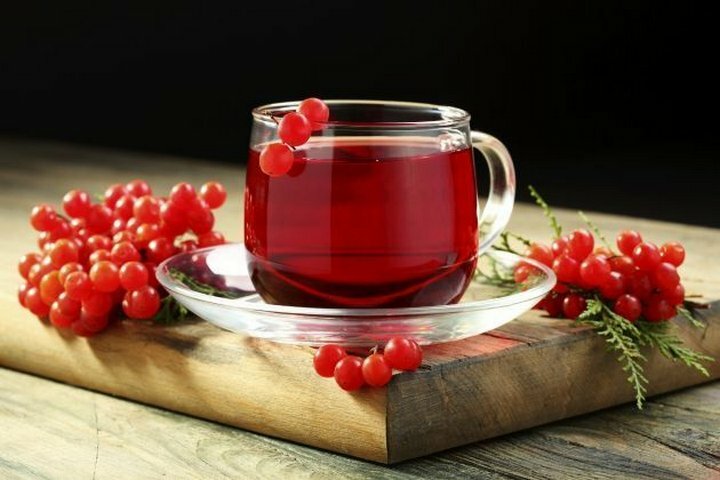 Recipe for decoction of the bark, recommended for nerve diseases and gastritis
Recipe for decoction of the bark, recommended for nerve diseases and gastritis
Take 15 grams of dried bark Kalina, pour 400 ml of water, put on fire and bring to a boil.Boil 5-10 minutes, cool, squeeze and add water to the original level.The broth should be taken 1 tablespoon 3 times daily before meals.
Use of fruit
The fruits of Kalina are shown in the following pathologies:
- hypertension;
- convulsive syndrome
- "cardiac" edema;
- atherosclerosis;
- colitis;
- enteritis;
- spasms of blood vessels;
- bronchitis.
It is also recommended to take berry infusion to restore normal immunity and general strengthening of the body during recovery after severe somatic diseases. Important: in the treatment of respiratory diseases( in particular - bronchitis), it is advisable to add natural honey to the water infusion, which contributes to the enhancement of the therapeutic effect of phytopreparations.
Prescription for berries Berries from swelling and for normalizing blood pressure
Take 5 tbsp.Spoonfuls of fresh or frozen fruits, grind and pour 600 ml of boiling water.Infuse 3 hours, then drain.Take the water infusion of fruit 100 ml 4 times a day( preferably - before meals).
Use of flowers Kalina
Biologically active substances present in the flowers of Kalina are able to stimulate gastric secretion and improve blood coagulability. Infusion of them is recommended for:
- hypoacid gastritis, i.e. with reduced acidity of gastric juice;
- pulmonary haemorrhage;
- shortness of breath on the background of colds.
Recipe for flower flowers Kalina
Take 1 tbsp.Spoon dried flowers, pour 200 ml of boiling water and leave for 1 hour, then drain.Take 15-20 ml( 1 tablespoon) after eating 2-3 times a day.
Note: Kalina berries are very low in calories( 26 kilocalories per 100 grams).This dietary product is recommended for people with excess weight and diagnosed obesity.
Contraindications
Means based on Kalina have a number of contraindications:
- individual hypersensitivity( sensitivity);
- increased susceptibility to thrombosis;
- thrombophlebitis;
- gout;
- actor;
- urolithiasis;
- severe renal failure.
Note: With acidity and hyperacidity gastritis, take Kalina's preparations with caution.
Methods of application
As a rule, plant-based phytopreparations are prescribed for oral administration.Outer infusions and decoctions of berries can be used to treat skin with various rashes, and locally - with nasal bleeding, impregnated with the drug tampons.Freshly squeezed juice of Kalina fruits should be drunk with liver diseases and bronchial asthma.It is also recommended for rinsing with inflammation of the oral mucosa( stomatitis) and throat( angina).Treatment of the skin with juice allows you to get rid of acne( acne) in the shortest possible time.
Viburnum during pregnancy
 Women who have a baby, Kalina preparations( in particular - its fruits) are recommended to drink as a fortifying agent, as well as to stimulate the process of hematopoiesis.Broths promote the increase in the number of red blood cells and increase the hemoglobin level of blood, which is especially important in the II and III trimesters of pregnancy.
Women who have a baby, Kalina preparations( in particular - its fruits) are recommended to drink as a fortifying agent, as well as to stimulate the process of hematopoiesis.Broths promote the increase in the number of red blood cells and increase the hemoglobin level of blood, which is especially important in the II and III trimesters of pregnancy.
Important: Before starting phytopreparations, it is necessary to consult with your doctor and put skin alergological tests!
Side effects of Kalina
After taking the decoctions and infusions of Kalina, side effects are extremely rare.In people with increased sensitivity( intolerance) of any active substances contained in parts of the plant, it is possible to develop allergic reactions.Intensification of gastric secretion can cause heartburn.With hypotension, an additional reduction in blood pressure sometimes leads to a loss of consciousness.
Application of Kalina in cosmetology
 Biologically active substances of this plant have a tonic, cleansing and rejuvenating effect on the skin.For the preparation of cosmetic masks, crushed berries( preferably fresh ones) are used, which are mixed with glycerin, honey, oatmeal and vegetable oil.For oily skin of the face, masks are recommended from the juice of Kalina, mixed with lemon juice and whipped egg whites.
Biologically active substances of this plant have a tonic, cleansing and rejuvenating effect on the skin.For the preparation of cosmetic masks, crushed berries( preferably fresh ones) are used, which are mixed with glycerin, honey, oatmeal and vegetable oil.For oily skin of the face, masks are recommended from the juice of Kalina, mixed with lemon juice and whipped egg whites.
Video:
Plisov Vladimir Alexandrovich, phyto-therapeutist

